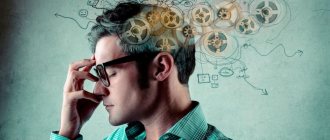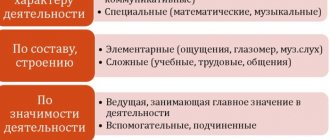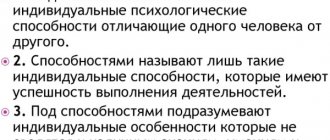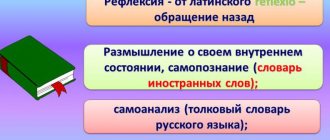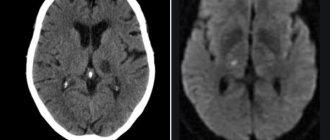Hello, dear readers of the KtoNaNovenkogo.ru blog. Probably most of you have discussed whether your friend or neighbor can be called an intelligent person. After this question, as a rule, a discussion begins, but by what criteria should we judge?
Is a smart person someone who has a lot of knowledge? But he is simply a carrier of information, and may not use it in practice and in life.
When scientists try to define intelligence, they always talk about human cognitive abilities - cognitive functions. What are they, how to develop them, and what to do if they “break down”? We will figure it out and become smarter for our friend.
What does this concept mean?
Having high cognitive abilities means being able to use the information we receive from the environment. This includes all types of mental activity: memorization, processing, data analysis. These are mental processes during which all information received now or previously received is processed and becomes suitable for its further use in life.
In simple terms, cognitive ability is the ability to use your brain.
If a person has them at a high level, then he can fully use the brain: remember, draw conclusions, apply knowledge in everyday life, change his mind, etc.
Drink coffee
Large amounts of coffee are harmful to the body, but researchers have found that caffeine does more than just keep you alert. It can help you concentrate on complex tasks, increases the efficiency of mental activity, and improves reaction. Coffee will not make a person smarter; this drink only temporarily improves brain function.
Coffee
Types of cognitive abilities
This group includes the following skills:
- Attention and concentration - the ability to focus on a specific activity without being distracted by external factors.
- Gnosis, or perception, is the ability to receive information from the outside.
- Memory – remembering, storing and recalling data at the right time.
- Praxis, or action, is the ability to apply knowledge, and not just memorize theory.
- Thinking, or logic - processing information, creating your own conclusions, generalization, comparison and other processes.
- Imagination is the ability to imagine, fantasize, dream, that is, to build your own images.
- Decision making is choosing the right option from several alternatives.
Now let's imagine a person who has developed all these skills. He easily remembers a large amount of information or filters out what does not need to be remembered. He knows how to concentrate, does not lose the thread of a conversation, and always understands the meaning of the text he has just read, because he is not distracted. Draws conclusions independently and has creative abilities.
All these skills are interconnected. And if you know how to develop them, any person will become like that. If you develop concentration, your memory will improve. And if you remember a lot of information, you will be able to make better conclusions and choices. Special methods will also help you with this; I wrote about them in an article on how to make decisions.
Give yourself permission to rest
In certain situations, it is really necessary to concentrate completely on the task and not stop to rest. Researchers have found that people who allow themselves to take breaks while working have much better memory than those who work without rest. It’s enough just to break away from your studies and think about something else.
Rest
Cognitive abilities and psychology
Each client, turning to a psychotherapist, receives a personal plan for working on himself. One of the areas widely used to solve a variety of problems is cognitive behavioral therapy.
Practitioners who use the tools of this direction argue that the cause of any problem lies in human thinking.
The psychologist tries to study the client, to identify his attitudes that are “hardwired” into memory and force him to act in a certain way. Then the specialist shows this attitude to the person and teaches him to think more effectively, that is, helps him change his thinking.
This clearly shows how closely related cognitive abilities are. First, a person receives a certain experience (in childhood or in adulthood). His brain processes this information and makes a certain conclusion - an attitude. In the future, the person makes decisions in accordance with the summed up results. If the conclusion is made incorrectly, and an attitude is formed that interferes with life, the person suffers from psychological problems.
The methods I will discuss below will help you avoid falling into this trap.
How does the brain develop?
Cognitive functions are formed in the first days of our life, when the brain begins to receive information about the outside world. The development of cognitive abilities in a child occurs in 3 stages.
- Visually effective (from 0 to 3 years). Children learn perception: to distinguish tastes, smells, appearance. They study the functions of dad and mom, as well as their characters. This is why children behave differently with their parents: for example, they are capricious with their mother, but obedient with their father.
- Visual-figurative (from 3 to 7 years). At this age, logical thinking develops. The child has already learned to perform simple tasks and begins to actively train his memory and imagination. This becomes the reason for children's inventions and untrue stories. This does not mean that the child is lying, but only indicates the growth of his cognitive abilities.
- Distracted (from 7 years old). The child learns to imagine and understand abstract concepts, that is, he tries to come up with something of his own based on the information received over the years.
To help children develop their cognitive abilities, it is necessary to give them daily attention, take them to various clubs, and teach them how to make decisions by example. In the future, the person will improve his skills independently.
Drink wine
Norwegian scientists have found that people who regularly drink wine perform better on cognitive tasks than those who give up alcohol. This connection is especially pronounced among women. Of course, wine can only help if its quantity is strictly limited. It is assumed that the features of this drink are based on the antioxidant properties of wine.
Coffee
How to develop cognitive functions
The abilities of our brain directly depend on our state of health. If the body has enough vitamins and good blood circulation, then you can count on proper brain function and the rapid formation of neural connections. Therefore, among the recommendations you will find not only specific mental exercises, but also lifestyle tips.
Create a complete diet
This does not mean that you need to deprive yourself of your favorite “harmful foods” forever. Most of the time, it is enough to ensure that your food contains the necessary minerals and vitamins. Also, be sure to stay hydrated - dehydration negatively affects brain function and cognitive function decreases.
To improve your mental abilities, add fats to your diet: nuts, oils, red fish. Also, do not forget about carbohydrates, which we need for energy, and proteins, without which organs cannot function normally.
sleep well
Lack of sleep primarily affects our brain. I think everyone has noticed the difference in well-being if they sleep 8 hours versus 3. The following recommendations will help improve attention, concentration and memory:
- sleep at least 7 hours a day;
- fall asleep before 22:00;
- 2 hours before bedtime, exclude emotional events;
- spend the night in a well-ventilated room.
It is also not recommended to watch movies, videos on your phone, or play computer games before going to bed. But since it is very difficult to adhere to this rule (I also like to spend time on my phone before going to bed), try to at least minimize irritating factors.
Eliminate bad habits
Stop smoking and alcohol first if you want your brain to function well into old age. Neurons that support all cognitive functions die due to the influence of alcohol, tobacco and psychotropic substances.
You can have a glass of wine at dinner with a friend or enjoy hookah once a month, but this should not become your regular pastime.
Reduce stress
“Easy to say!” – you will be indignant, and I will understand you. But you need to deal with stress. All cognitive functions suffer from it.
During a stressful situation, the amygdala of the brain (in scientific language - amygdala) is activated. It turns off our ability to think rationally, logically and blocks parts responsible for cognitive functions. The body works in “fight or flight” mode, when its only task is to hide from danger.
This applies not only to serious shocks, but also to such “little things” as nervous work, quarrels with your husband and worries about lack of money.
The harmful effects of stress can be reduced through regular meditation and other anxiety-reducing practices.
Organize an information detox
Our brain perceives information constantly throughout the day. Everything we hear, see and feel is recorded by neurons. If we load our heads with a large amount of unnecessary data, then the brain will have to “free up” space for them due to a decrease in cognitive functions.
How to improve brain function:
- don't watch TV;
- limit viewing of entertainment programs;
- reduce the time spent monitoring bloggers;
- try every day to be alone with yourself, without talking to anyone.
Your brain remembers information about what a girl you didn’t know on Instagram ate for breakfast or what happened to a person who had an accident in another part of the city. Instead, it is better to load it with useful data, depending on your interests. For example, a new recipe or knitting pattern.
I recommend regularly having a day when you don't use the Internet. For me this is once every 2 weeks. Take this time for yourself and do what you love.
Look for brain-healthy stimuli
The “detox” has been arranged, now you need to load your head with useful information. Here are some good ideas:
- go to a concert;
- visit an art gallery;
- visit nature;
- visit a restaurant and try a new dish;
- read a book;
- study a scientific experiment;
- go to the cinema to watch a quality film.
It is important that incentives are of high quality. If the book is a classic, history or self-development. If the film is a documentary or about a famous person who has achieved success.
Play sports and relax actively
Fast walking is also a sport. Therefore, there is no need to buy an expensive gym membership. You can ride a bike, swim, jump rope. This is necessary, especially for people with sedentary work.
If you are too lazy to exercise, I recommend our article on how to motivate yourself to exercise.
Some interesting exercises
They help develop high cognitive abilities in children and adults who have been stuck in place.
- Crossing movements. Lie on your back on a flat surface. Bend your left leg at the knee, your right arm at the elbow and bring them together. Then repeat the action with your right leg and left arm. Movements should be slow. This stimulates brain activity.
- Exercise "Elephant". It is carried out standing. Tilt your head towards your right shoulder. Extend your right hand forward and try to draw an infinity sign with it. Do it alternately for both sides. It helps improve the body-brain connection and is good for children as they learn to read and write.
- Synchronized drawing. Take pencils in both hands. Place a blank sheet of paper on the table. Try to draw symmetrical shapes with both hands at the same time. Improves coordination, stimulates the left and right hemispheres of the brain.
Dancing is also recommended. Try it at home while listening to your favorite song – it’s a great stress reliever and improves your mood. Or join a dance studio near you to learn new moves and improve your memory.
